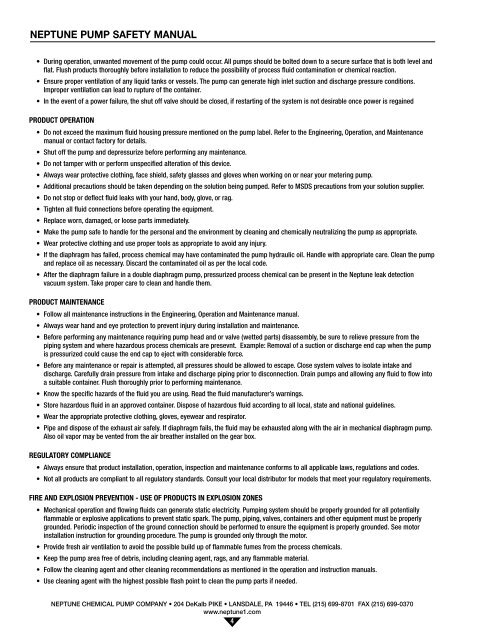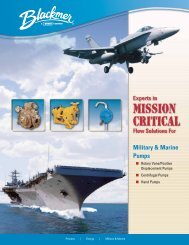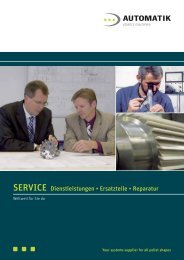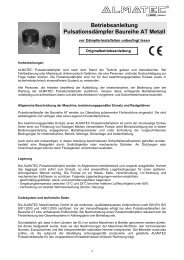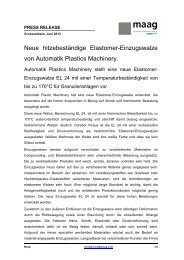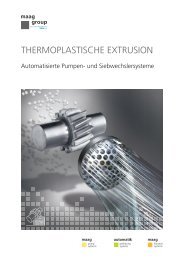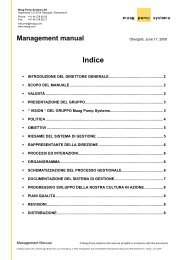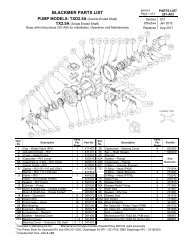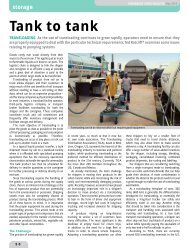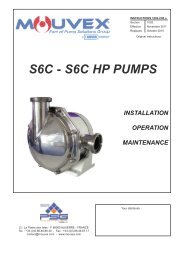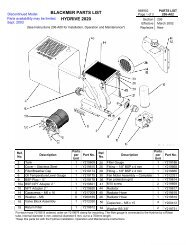DIAPHRAGM METERING PUMPS - Pump Solutions Group
DIAPHRAGM METERING PUMPS - Pump Solutions Group
DIAPHRAGM METERING PUMPS - Pump Solutions Group
Create successful ePaper yourself
Turn your PDF publications into a flip-book with our unique Google optimized e-Paper software.
NEPTUNE PUMP SAFETY MANUAL<br />
• During operation, unwanted movement of the pump could occur. All pumps should be bolted down to a secure surface that is both level and<br />
fl at. Flush products thoroughly before installation to reduce the possibility of process fl uid contamination or chemical reaction.<br />
• Ensure proper ventilation of any liquid tanks or vessels. The pump can generate high inlet suction and discharge pressure conditions.<br />
Improper ventilation can lead to rupture of the container.<br />
• In the event of a power failure, the shut off valve should be closed, if restarting of the system is not desirable once power is regained<br />
PRODUCT OPERATION<br />
• Do not exceed the maximum fl uid housing pressure mentioned on the pump label. Refer to the Engineering, Operation, and Maintenance<br />
manual or contact factory for details.<br />
• Shut off the pump and depressurize before performing any maintenance.<br />
• Do not tamper with or perform unspecifi ed alteration of this device.<br />
• Always wear protective clothing, face shield, safety glasses and gloves when working on or near your metering pump.<br />
• Additional precautions should be taken depending on the solution being pumped. Refer to MSDS precautions from your solution supplier.<br />
• Do not stop or defl ect fl uid leaks with your hand, body, glove, or rag.<br />
• Tighten all fl uid connections before operating the equipment.<br />
• Replace worn, damaged, or loose parts immediately.<br />
• Make the pump safe to handle for the personal and the environment by cleaning and chemically neutralizing the pump as appropriate.<br />
• Wear protective clothing and use proper tools as appropriate to avoid any injury.<br />
• If the diaphragm has failed, process chemical may have contaminated the pump hydraulic oil. Handle with appropriate care. Clean the pump<br />
and replace oil as necessary. Discard the contaminated oil as per the local code.<br />
• After the diaphragm failure in a double diaphragm pump, pressurized process chemical can be present in the Neptune leak detection<br />
vacuum system. Take proper care to clean and handle them.<br />
PRODUCT MAINTENANCE<br />
• Follow all maintenance instructions in the Engineering, Operation and Maintenance manual.<br />
• Always wear hand and eye protection to prevent injury during installation and maintenance.<br />
• Before performing any maintenance requiring pump head and or valve (wetted parts) disassembly, be sure to relieve pressure from the<br />
piping system and where hazardous process chemicals are presevnt. Example: Removal of a suction or discharge end cap when the pump<br />
is pressurized could cause the end cap to eject with considerable force.<br />
• Before any maintenance or repair is attempted, all pressures should be allowed to escape. Close system valves to isolate intake and<br />
discharge. Carefully drain pressure from intake and discharge piping prior to disconnection. Drain pumps and allowing any fl uid to fl ow into<br />
a suitable container. Flush thoroughly prior to performing maintenance.<br />
• Know the specifi c hazards of the fl uid you are using. Read the fl uid manufacturer’s warnings.<br />
• Store hazardous fl uid in an approved container. Dispose of hazardous fl uid according to all local, state and national guidelines.<br />
• Wear the appropriate protective clothing, gloves, eyewear and respirator.<br />
• Pipe and dispose of the exhaust air safely. If diaphragm fails, the fl uid may be exhausted along with the air in mechanical diaphragm pump.<br />
Also oil vapor may be vented from the air breather installed on the gear box.<br />
REGULATORY COMPLIANCE<br />
• Always ensure that product installation, operation, inspection and maintenance conforms to all applicable laws, regulations and codes.<br />
• Not all products are compliant to all regulatory standards. Consult your local distributor for models that meet your regulatory requirements.<br />
FIRE AND EXPLOSION PREVENTION - USE OF PRODUCTS IN EXPLOSION ZONES<br />
• Mechanical operation and fl owing fl uids can generate static electricity. <strong>Pump</strong>ing system should be properly grounded for all potentially<br />
fl ammable or explosive applications to prevent static spark. The pump, piping, valves, containers and other equipment must be properly<br />
grounded. Periodic inspection of the ground connection should be performed to ensure the equipment is properly grounded. See motor<br />
installation instruction for grounding procedure. The pump is grounded only through the motor.<br />
• Provide fresh air ventilation to avoid the possible build up of fl ammable fumes from the process chemicals.<br />
• Keep the pump area free of debris, including cleaning agent, rags, and any fl ammable material.<br />
• Follow the cleaning agent and other cleaning recommendations as mentioned in the operation and instruction manuals.<br />
• Use cleaning agent with the highest possible fl ash point to clean the pump parts if needed.<br />
NEPTUNE CHEMICAL PUMP COMPANY 204 DeKalb PIKE LANSDALE, PA 19446 TEL (215) 699-8701 FAX (215) 699-0370<br />
www.neptune1.com<br />
4


